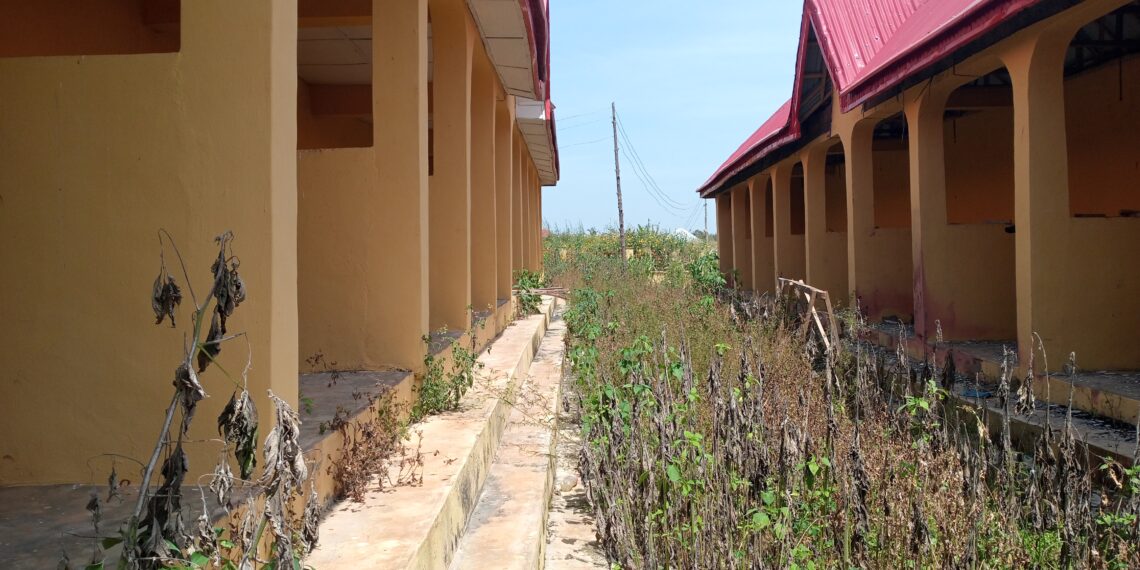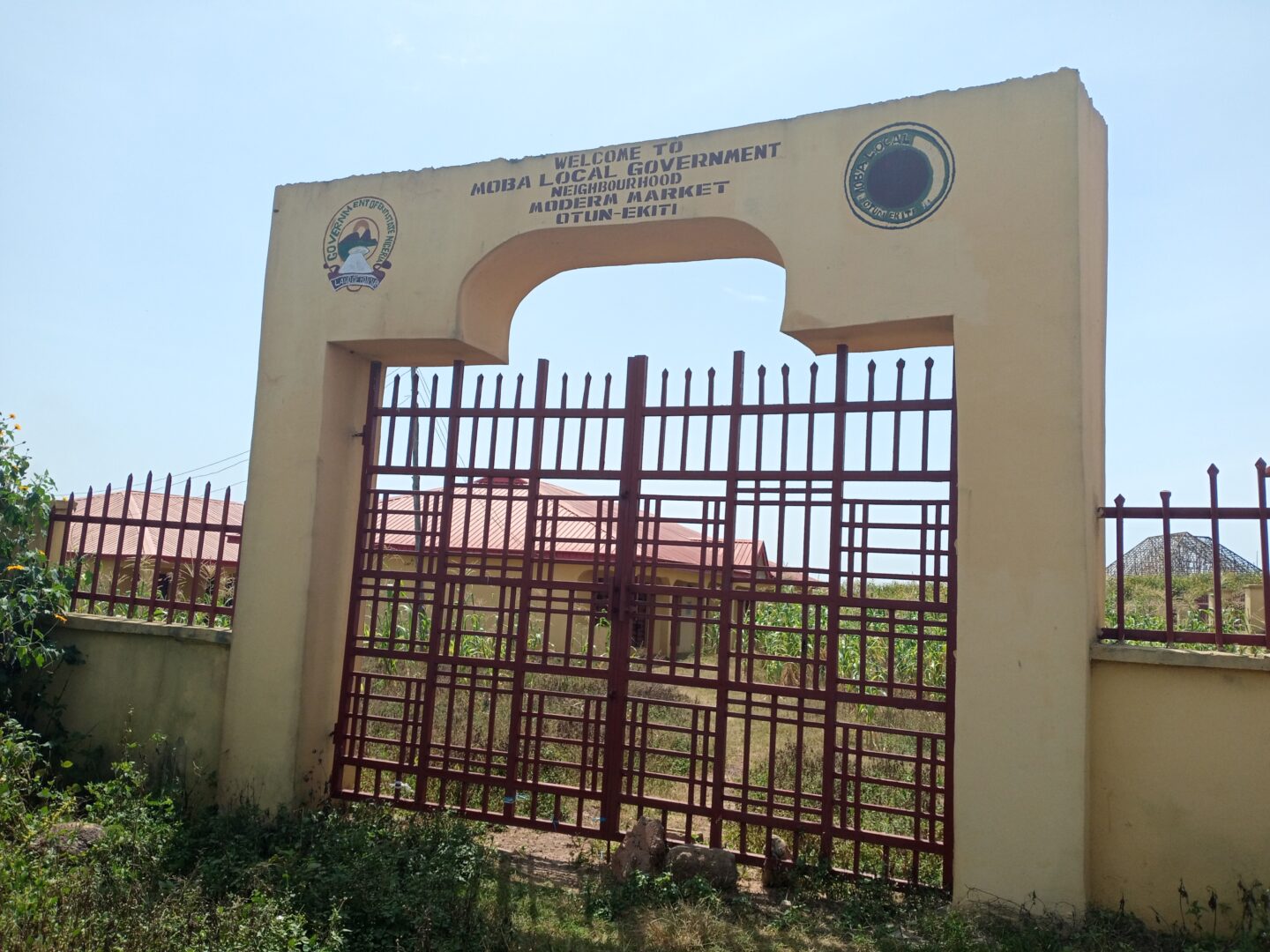...To get all news updates, Join our WhatsApp Group (Click Here)
Also Join our WhatsApp Channel (Click Here)
On November 8, the cloudy sky changed the bustling mood at a local market in Otun, the headquarters of Moba Local Government Area of Ekiti State, south-west Nigeria. A downpour soon arrived that drenched many of the traders.
By the side of the road near the market was Abubakar Muhammad, who repairs and sells electronics. He said his petty business was collapsing. The previous time there was rain, his gadgets and electronic materials were swept by the flood. Many of them were damaged.
“Before I finished packing my electronics, the water had drenched many of my radios,” Mr Muhammad told UDEME. “The radio appliances touched by the floods stopped working. I lost about N45,000. That would not have happened if I had a shop. Nobody was there to help me. Other people too were rushing to pack their things.”
The middle-aged man said he had tried to rent one of the new shops in the market but failed. He then joined other traders selling at the roadside. His wares and chair were arranged under an umbrella from where he called and attended to customers. He had been in the same location for 13 months.

It was perhaps to rescue people like Mr Mohammed that former Governor Kayode Fayemi between 2010 and 2014, during his first term, initiated a project to build “modern neighbourhood markets” across the 16 local government areas of the state. The markets, designed to feature lock-up shops, open stores, toilets and water facilities, would boost economic activities in the state, the governor had said.
It took years to complete the projects as some of them were only commissioned by the governor in July, about three months before the end of his second non-consecutive term. However, while the new modern markets in other areas of the state are partially open for use, the facilities in Otun-Ekiti and Oye-Ekiti have remained locked since they were commissioned.
This has left many of those targeted to rent spaces in the facilities to continue their trading by roadsides. Many of the roadside traders interviewed by UDEME said the delay in opening up the new market for use has defeated the purpose of the project. They said they were eager to rent the shops to carry on their trade under decent conditions.
Florence Adefula sells smoked fish by a roadside in Otun-Ekiti. She told UDEME that the lack of a proper market space hurts her petty trade. “Any time it rains, all of us selling here run helter-skelter, packing up our things,” she said. “And when it is the dry season like this, dust will not allow one to rest.”
Inside the abandoned neighbourhood market
When UDEME visited the new market in Otun-Ekiti, a section of it had been overgrown by shrubs. The facility has four blocks with 28 locked-up shops and 28 open stores. It also has a motorised water system and toilets.
The market in Oye-Ekiti has also been overtaken by weeds when UDEME visited. The facility has become a home for reptiles and rodents, to the fear and consternation of their human neighbours.
“If they will not use it, at least, they should be clearing the bushes,” Bisola Ajalaye, a resident of Oye whose house is close to the facility, told UDEME. “Snakes are living in that place and I have told my children to always lock our doors so that the snakes will not enter our house.”
A female student of Federal University Oye-Ekiti (FUOYE), Ayomide Akintunde, also lives close to the facility. She said its current state poses security risks to residents of the area.
“At night, the road at the front of the market is always very dark and I have to pass through it to get to my hostel,” she said. “Most of the time, we female students seek the company of males to pass through that place. They should please do something about it.”
Why facilities are abandoned
Reacting to the findings in this report, Biodun Adebayo, the head of the community and development department at Oye-Ekiti Local Government secretariat, acknowledged that the neighbourhood market was commissioned in July by the wife of the former governor, Bisi Fayemi.
“After the commissioning, what the wife of the governor said was that the chairmen and traditional rulers that fall within those LGA and its LCDAs should put their heads together and distribute the stores and the shops at the market, among themselves,” Mr Adebayo said.
The Fayemi administration had created two local council development areas (LCDAs) – Ifesowapo and Ifeloju LCDAs located in Isan-Ekiti and Ilupeju-Ekiti, respectively, out of Oye Local Government Area. This means the new facility is now under the administration of three local councils.
“Till now, the LCDAs and LGA have not met to distribute the facility let alone put it into use,” Mr Adebayo added.
ⓘ
About the maintenance of the facility, he said: “During the rainy season, we used to take care of that place every two months. But this is the dry season where there would be no need for constant clearing.”
The Chairperson of Ifeloju LCDA, Babatunde Ogunmilugba, blamed the abandonment of the facility on the slow decision-making process at the LCDAs and Oye LGA.
“What we are waiting for is the Oye LGA to invite us to a meeting. Soon, we are going to have the meeting and the place will be distributed,” he said.
In Moba LGA, Adediran Agboola, a top official of the council, said the authorities were in the process of giving the shops out to traders “who can keep the place neat.”
“Unfortunately, during this process in 2019, the king died and the plan was suspended. But since the installation of a new king, they have not been able to sit to decide what next to do with the facility. And that is where we have been since.”
But the new king of Otun-Ekiti, Adekunle Adeagbo, said the market facility is not under his jurisdiction.
“I cannot tell you much about that place,” he said when UDEME visited him in his palace. “The best people to respond to you are in the local government because it is under their authority, not my own as the king,” he said.
This story was supported by the UDEME (www.udeme.ng) project of the Centre for Journalism Innovation and Development (CJID).
Additional Information and photos from The Premium Times!
You can get every of our news as soon as they drop on WhatsApp ...To get all news updates, Join our WhatsApp Group (Click Here)
Also Join our WhatsApp Channel (Click Here)

















